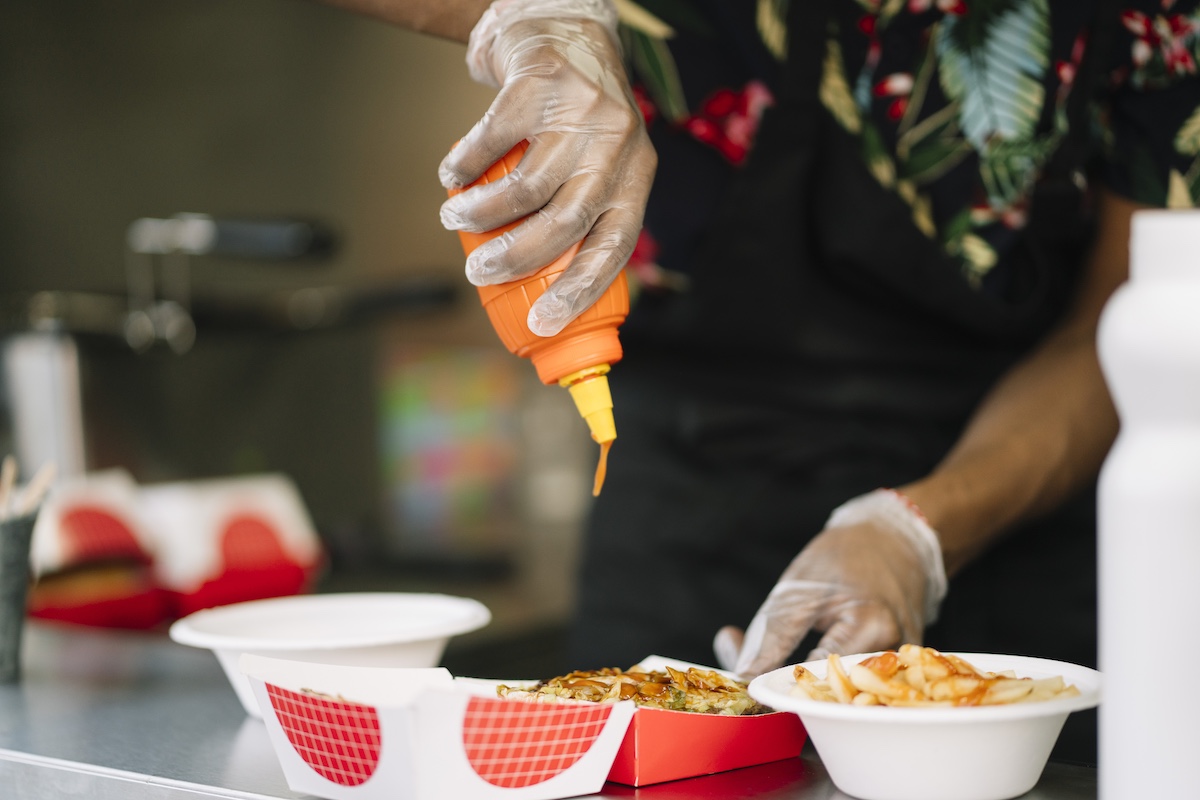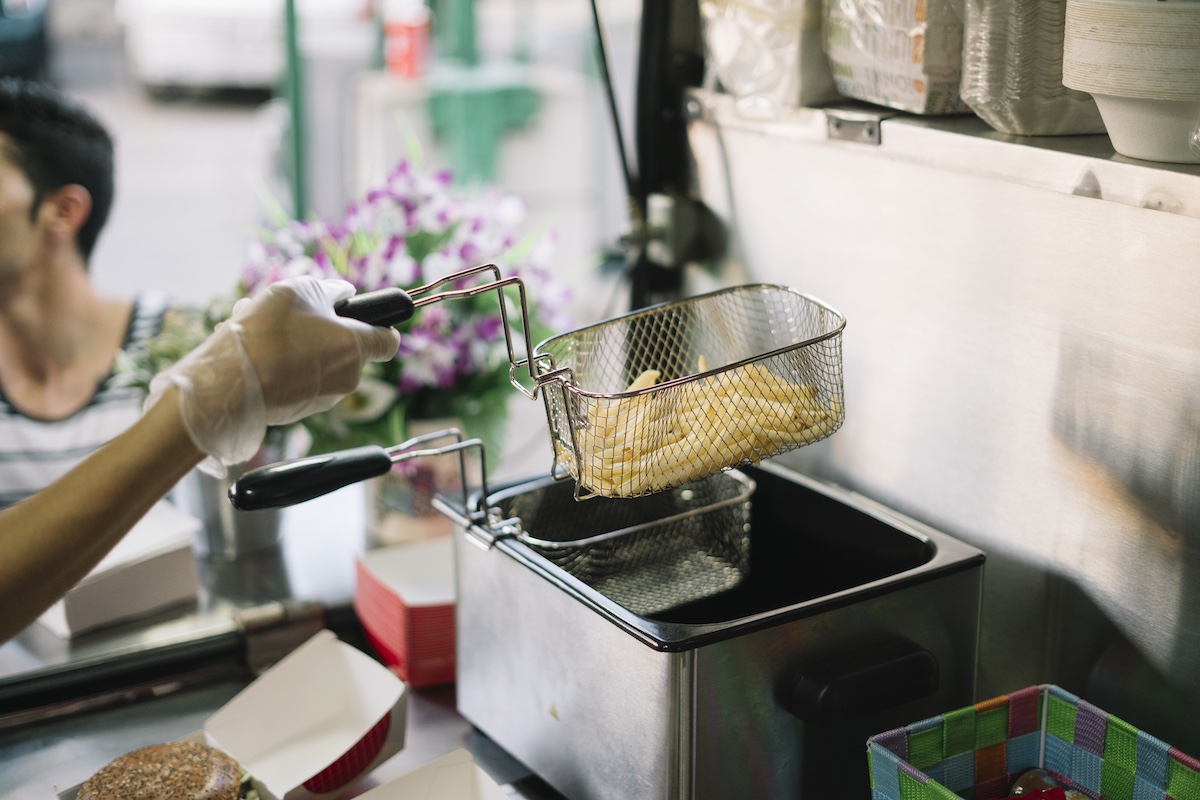In the fast-food industry, there's what you read in the manuals, and then there's the reality on the ground. I'm sure you experience it every day: running a fast-food or snack restaurant isn't just about serving hot burgers or wraps. It's a series of fast-moving, sometimes invisible decisions that affect margins, efficiency and customer satisfaction. To help you make the right choices on a daily basis, here are 10 fast-food secrets that are rarely shared, and above all, concrete levers for improving your profitability without sacrificing the quality of your service.
1. Margins are lower than you think
Actual cost of raw materials
You may think you've got your costs under control, but did you know that raw materials often account for 34-35% of your sales? It's a major item, sometimes underestimated, which can quickly eat into your margins if you don't keep a close eye on it.
Recommended gross margins
To keep your restaurant profitable, try to aim for a gross margin of around 70% on solid dishes and around 80% on beverages. These are reliable benchmarks to ensure you're not operating at a loss.
Adjusting sales prices
Raising your prices, even by a few cents, can make a real difference. For example, €0.20 more on one of your star menus can add up to several thousand euros over the year, without scaring your customers away, provided you communicate well.
2. Hidden costs explode if you don't keep track of them
Invisible expenses to watch
Energy, packaging and even food waste are often silent cash leaks that go unnoticed until the bill climbs without you really understanding why. So it's essential to keep an eye on them every month.
Inventory management errors
Poorly managed stock leads to wastage and stock-outs, which slow down your business and cost you dearly. Whether you run a snack bar or a fast-food restaurant, having an inventory management tool adapted to your pace is essential to limit these losses and better anticipate your orders.
Load monitoring with digital tools
Today, a cash register software connected to your purchases and sales is a real plus. It gives you clear, real-time indicators of your costs and margins. So you can adjust your decisions quickly, rather than chasing figures at the end of the month.
3. Profitability depends on speed and rotation
Impact of service time
The faster you serve, the more customers you can accommodate in the same hour. Every second you save means an additional order, and therefore more sales and revenue. Don't underestimate this impact!
Kitchen organization
Well-defined stations, visible process sheets and clear roles- it sounds simple, but it's the basis for your team to be efficient right from the start of service. These best practices, widely used in franchises, can really boost your productivity and save you precious time.
Consequences of production delays
Just imagine: 30 seconds late on each order means about 50 minutes lost over the course of a day with 100 customers. That's a lot of orders you don't take, and that's a lot of lost sales.
👉 To find out more: Restaurant kiosks: the guide to choosing the right kiosk
4. Digitization is no longer a choice, it's a necessity
Increased sales with kiosks and Click & Collect
Installing order terminals or offering Click & Collect is no longer a luxury afforded only by large franchises; it's now a necessity. On average, these tools increase the average shopping basket by 15%, while making the experience more fluid and pleasant for your customers. Less waiting, fewer errors, more sales - a real winning combo.
The role of data in upselling
With the right digital tools, you can automatically suggest complementary products adapted to each customer's habits. For example, offer a dessert or a drink with the main menu, without your team having to do it manually. This is what's known as automatic upselling, an effective lever for increasing your sales without any extra effort.
Examples of successful digitalization
All the major chains have done it. Digitalization is no longer an option, it's a key competitive factor. At Double XL, for example, the introduction of ordering kiosks has made the customer journey smoother, reduced waiting time and increased the average basket by 33%, thanks to personalization and suggestions.
The independents are also getting in on the act, on their own scale: in-store order screens, connected cash register tools, payment in instalments solutions, etc. All these tools save time, improve customer satisfaction and boost profitability. These tools save time, improve customer satisfaction and boost profitability.

5. Local marketing is your most profitable weapon
Effectiveness of geolocation campaigns
With Google, Instagram or TikTok, you can launch targeted advertising campaigns that attract people directly to your restaurant. These campaigns work very well, even with reasonable budgets.
Creation of an independent customer base
Rather than relying solely on Uber Eats or Deliveroo, think about building customer loyalty with your own tools: loyalty card, SMS, Click & Collect promotions, etc. These approaches will prove more profitable in the long term, and give you more control.
Concrete results in the field
In Lyon, a fast-food restaurant we work with doubled its sales between 2pm and 5pm thanks to a targeted promotion on Google Maps, for a budget of just €30. Proof that local marketing done right pays off!
6. Menu choice determines 80% of your sales
Promoting a flagship product
A single star product, if well thought-out, profitable and visually appealing, can make your sales take off. It's often the reason customers come to your restaurant, so make the most of it on your menu and in the window.
Building profitable formulas
Less choice means more clarity for the customer and less complexity in the kitchen. Promote formulas with a good margin/volume balance, and favor combos that encourage the addition of a drink or dessert at a low price.
Trend monitoring 2024-2025
Today's customers love plant-based alternatives, hot bowls and shareable formulas, as well as signature homemade drinks and limited editions. These are all options you can explore to stand out from the crowd, try new things and keep your customers coming back for more.
👉 Going further : 7 steps to creating your fast-food menu

7. Team building makes or breaks profitability
Consequences of a poorly trained team
Errors at the till, leftover dishes, frustrated customers- all these little grains of sand, put together, slow down your efficiency and eat away at your margins. And often, the problem stems from a lack of training.
Setting up a simple training plan
You don't need a big budget to train your teams effectively. Short, regular briefs, visual aids in the kitchen, binômage for newcomers, and so on. By implementing a few simple routines, you'll improve the fluidity and quality of your service.
Methods used by franchises
The major chains rely on clear processes and continuous on-the-job training. The result: teams that are up and running quickly, and service that's always top-notch, even in busy periods. These methods are perfectly applicable to your establishment, whatever its size.
8. Customer loyalty is 3 times more profitable than acquisition
Setting up a loyalty program
Whether it's with a stamped card, a QR code to scan or a mobile app, building customer loyalty has never been easier. The key is that it's quick to understand and easy to use, both for them and for you.
Valuing regular customers
A little note, a discount on their favorite product, a free drink from time to time - these little touches make all the difference. Loyal customers come back more often, spend more and talk about you to others.
Return on loyalty investment
Investing in customer loyalty often pays off far more than acquiring new customers. Offers for regular customers create a virtuous circle: they are satisfied, come back more often, recommend your restaurant and consume more.
Well thought-out loyalty programs via points cards, mobile applications, or simple personalized offers, help turn occasional customers into regular customers, with a direct and measurable impact on your sales.
9. Location no longer sufficient for success
The importance of local referencing
Today, many customers search for a restaurant on their phone before they cross the threshold. If you don't show up in the first Google or Maps results, you're missing out on a big chunk of traffic.
Optimizing your Google listing
Add recent photos, keep your opening hours up to date and respond to customer reviews (especially the negative ones). These are small, simple gestures, but they have a big impact on referencing and the customer's final decision.
Simple actions for local domination
- Publish a news item or photo every 15 days,
- Add local keywords to your description (e.g. "homemade tacos Lyon 7"),
- Ask your satisfied customers for regular feedback.
With these reflexes, you can quickly gain an advantage over your competitors just a few blocks away.
👉 To find out more: How to make your restaurant visible through SEO?
10. Successful franchises rely on continuous innovation
New formats to explore
Dark kitchens, pick-up points, fixed or hybrid food trucks: these concepts enable you to cut costs, test new neighborhoods or expand your catchment area without opening a traditional restaurant.
Permanent test and learn
Add a product, test a formula, remove what doesn't work. Agility is the best weapon for adapting to changing tastes and maximizing what works. It's better to test a €100 idea than miss a €10,000 opportunity.
Further resources
Want to open several establishments? See our article: Creating a chain of restaurants.
These 10 fast-food secrets are not miracle recipes, but concrete optimization levers that can be activated today. Profitability, loyalty, digitalization, training - everything is interconnected. And the good news is that by working on just one of these points, you'll start to improve your results.
-
Would you like support in meeting these challenges? Innovorder 's solutions are designed to help you digitalize, manage and make your fast-food restaurant profitable - simply, effectively and sustainably.







